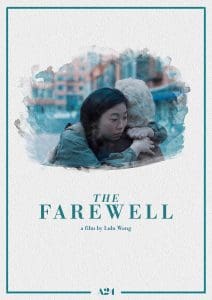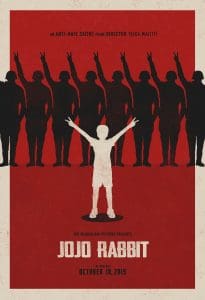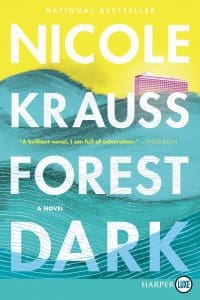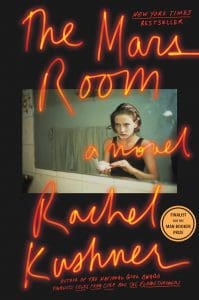Our Staff Recommends for February 2020 includes a look back at some of the most acclaimed films of last year, a novel by Nicole Krauss, and more—so here’s a sampling of what we’ve been reading, watching, and listening to lately:

Alicia Long, Intern: In 2019, director Lulu Wang made waves with the indie dramedy The Farewell. Although 2018’s Crazy Rich Asians certainly drew a bigger crowd at the box office, the undoubtable success of these two films so close together made the much-welcome case that there is in fact an audience for Asian–American stories in film. That said, The Farewell handles its subject matter very differently than Jon M. Chu’s romantic comedy. With striking and artfully crafted shots, a haunting score, and a powerful story, The Farewell stands out in its own right.
We meet our protagonist, Billi (played by Awkwafina), struggling with rent and the daily grind in New York City when she learns that her grandma Nai Nai, who lives in China, has stage-four lung cancer. Upon hering of the terminal diagnosis, the family decides it’s best to spare Nai Nai the news. To make the most of Nai Nai’s remaining time, they hurriedly organize a wedding in China for her grandson as a means of bringing the family together without raising suspicion. Billi, torn by the news and believing that it is inherently wrong to lie, is told not to come for fear that her emotions will get the best of her and she’ll reveal the difficult truth to her grandmother. But Billi is grief-stricken and more than a little headstrong, so she goes against their advice and travels to China, determined, if nothing else, to see her grandmother one last time.
This trip is also a homecoming for Billi: having immigrated from China with her parents as a young girl, Billi is brought to reflect on this uprooting, and the rift that now exists between her past and present home. As she wrestles with her sense of displacement, she is also forced to maintain the lie surrounding her grandma’s condition, forcing her to reconcile the American urge to cope through openness with the Chinese norm of carrying one’s burdens in silence. Wang brings cultural attitudes on death and dying to the forefront in this film, allowing for American and Chinese values to clash whilst giving equal merit to both. But what might make this film all the more impactful is that these heavy topics are presented with a gentle hand, one that always allows us to see the humor in the situation. Even particularly loaded scenes play out in a uniquely understated manner. In this way, the film lingers on many aspects of the Asian–American experience that often go unspoken.
The Farewell a movie that stays with you long after a viewing. The characters are memorable and endearingly human, the cinematography is captivating, and, regardless of your attachment to the immigrant experience or your attitudes on managing illness, it is a story that will resonate. For all of its intricacies, what shines through is a story about family and the ways we must learn to carry loss, sometimes even before a thing is truly gone from us.

Alecsander Zapata, Intern: I went into Taika Waitit’s Jojo Rabbit bracing for impact. Not only was I watching it right after Parasite, one of the most tense movies of the last decade, but Rotten Tomatoes also warned me that the film wasn’t for everybody. Critics claimed it was “audacious to a fault.” That made me a bit nervous, to be honest. I have a pretty high tolerance for offensive humor, but I was anxious to see if this was the kind of film that would push my not inconsiderable limits.
About ten minutes in and one “Imaginary Adolf Hitler Conversing With a Ten-Year-Old” scene later, I realized I should have trusted Waititi from the beginning. If there’s anybody who could make a coming-of-age film about a brainwashed Nazi boy with an imaginary Hitler for a best friend (played by Waititi himself), it’s the director of What We Do in the Shadows. Waititi and his wonderfully casted ensemble treat the story with so much tenderness and care that I forgot to be offended. It’s filled with the Kiwi filmmaker’s signature off-the-wall charm and energy, yet he still manages to give us something unexpected: a Gestapo search scene about two-thirds into the movie rivals even Parasite in terms of white-knuckle suspense.
More than anything, though, the film possesses courage, perhaps more so than any of last year’s Best Picture nominees. It has the courage to put powerful ideas alongside irreverent parody and vibrant colors; to risk everything the film is trying to achieve by resting its success squarely on the shoulders of an untested twelve year-old actor; and to tell a story that deals with such provocative subject matter at time when racial tensions in the United States feel as though they’ve never been more threatening.
Taika took a lot of risks with Jojo Rabbit. But thanks to his fearlessness, the film proves a resounding success.

Laura Cogan, Editor: Suspicion of narrative and its inherent tendency to pull the chaos of life into a shape, to create order, and from that meaning, is a central concern in Forest Dark, Nicole Krauss’s 2017 novel. It’s a subject of urgent personal concern to both the main characters, who find themselves suddenly uncertain of their lifelong efforts to exert control over the material of life, and it is woven throughout as a warning to the reader that such expectations may be thwarted here. It’s even a factor in one character’s appreciation of Tel Aviv, where she notes: “The shameless dilapidation of the buildings, sweetened by the bright fuchsia bougainvillea that grew over the rust and the cracks, asserting the importance of accidental beauty over that of keeping up appearances.”
The artistry of narrative lends itself to elucidating some truths, while also tending to cover up others—and the artifice of the thing haunts Krauss, and as well as one of her main characters (a writer named Nicole). “Narrative cannot sustain formlessness any more than light can sustain darkness—it is the antithesis of formlessness, and so it can never truly communicate it. Chaos is the one truth that narrative must always betray, for in the creation of its delicate structures that reveal many truths about life, the portion of truth that has to do with incoherence and disorder must be obscured.” This is a startling statement from a writer celebrated by readers for her grace in spinning narratives of classically satisfying arcs and resolutions. There’s a wary remove here, far less sentiment, and more sharp edges, but still plenty of beauty, plenty of narrative promise made in the first half and fulfilled (in its own way) in the second. I imagine this novel may frustrate some fans of Krauss’s more conventional bestseller History of Love, but for others it will be replete with gifts. I did not come to Forest Dark expecting quite so much on Kafka, ruminations on Freud and the layers of meaning in language (how the word “home” in Hebrew contains the seed of something hidden), or observations of the complexity and intensity of Israel so uncannily familiar to my own experiences there. Nor did I expect to find a kind of kinship between this book and the outstanding Rachel Cusk trilogy (Outline, Transit, and Kudos). I would have loved to see Krauss pursue the idea of control even further—and perhaps we will, in the future. It’s fascinating to watch an author develop from one book to the next.
If Krauss makes a deliberate point of questioning and subverting the expectation that narrative create order out of the stuff of life, she finds (as others have before her) that the structure of the novel is flexible enough to allow room for such experimentation—as long as the reader is willing. I am. There is solace in reading a story that reflects back to us a less palatable truth: that the need for story, and for meaning, is profound, but equally profound is the ultimate uncertainty underpinning our days—the chaos and uncertainty both within, and without. If we close out the chaos, the story rings false.

Zack Ravas, Editorial Assistant: Published in 2018, Rachel Kushner’s The Mars Room was a New York Times Bestseller as well as a finalist for the Booker Prize, and my paperback edition boasts a blurb from no less than Stephen King (“The Mars Room is the real deal,” declares the King)—so while I’m merely adding to the chorus of praise the book has already received, I find myself unable to write about anything else this month simply because reading The Mars Room was far and away the most compelling experience I had in February.
I tore my way through the book in a matter of days, propelled by the novel’s taut, almost noir-ish sensibility and Kushner’s force of vision. The plot is focused largely on the experiences of Romy Hall, a former stripper at San Francisco’s The Mars Room who, as the novel opens, is currently serving two consecutive life sentences for the murder of her mentally unstable stalker. Romy’s story is grim—and the portrait Kushner paints of our City by the Bay (no doubt inspired by her family’s move to the region in the Eighties) is hardly the usual romance:
I sometimes think San Francisco is cursed. I mostly think it’s a sad suckville of a place. People say it’s beautiful, but the beauty is only visible to newcomers, and invisible to those who had to grow up there. Like the glimpse of blue bay through the breezeways along the street that wraps around the back of Buena Vista Park.
Brutal. Kushner is the rare contemporary novelist who inspires a sense of awe: not only does she delicately tackle some loaded subject matter, including the racial and sexual dynamics of the women’s prison system, but she’s able to leap between different perspectives without losing the reader, even going so far as to incorporate material inspired by the journals of the Unabomber, Ted Kaczynski. Ultimately, the novel depicts how one’s concept of “victory” or “survival” must be redefined in the wake of incarceration. A major work, The Mars Room has me eager to discover what Kushner does next. In the meantime, local readers can catch her in conversation this June as part of City Arts & Lectures.
